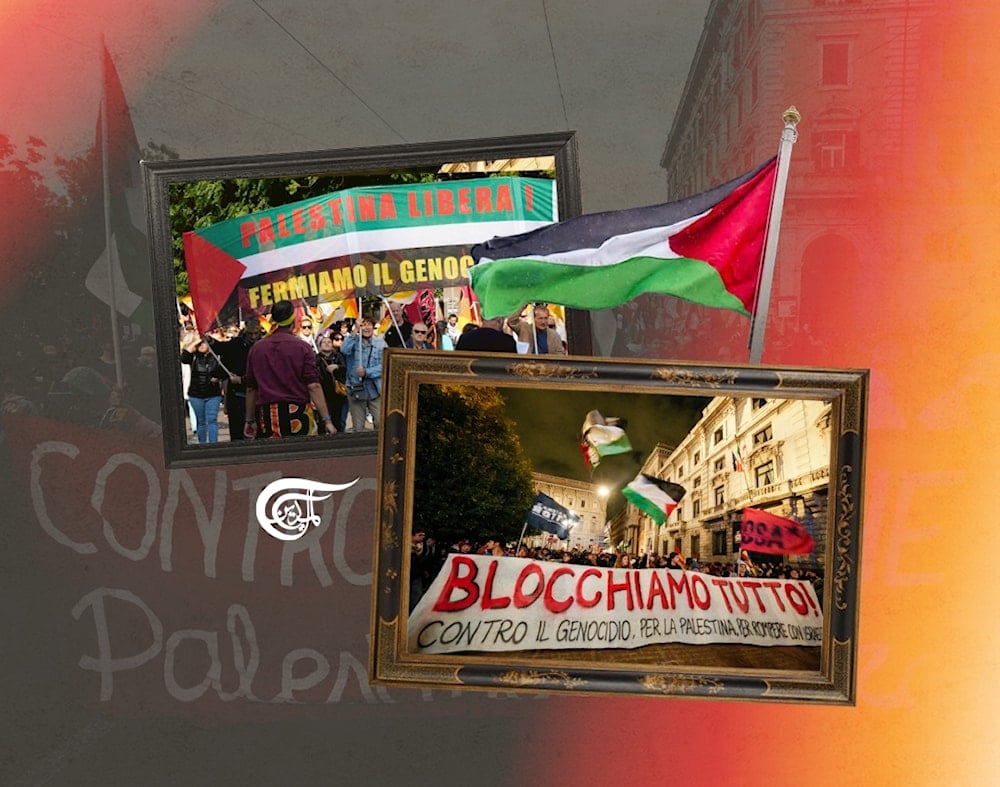Labor Internationalism and Palestine
Italian workers’ general strike marks a global labor reawakening, tying struggles over wages and conditions to the fight against Zionism, US imperialism, and for Palestinian liberation.
-

At the departure of the Sumud Flotilla to break the siege on Gaza, Italian dockworkers stated that if their comrades were attacked, or “if we lose contact with our boats…even for just 20 minutes, we will shut down all of Europe” (Illustrated by Ali al-Hadi Chmeis to Al Mayadeen English)
With the news of the September 22nd general strike in Italy, a new chapter has been opened in the movement for Palestine within organized labor. Although, a more instructive way to view this would be not as a new chapter, but a re-awakening of the labor movement after the neoliberal coma in which it found itself since the late 1970s. This article serves to explore the various labor actions for Palestine; there will be a short focus on some early labor actions but the main focus will be on labor actions within the context of Al Aqsa Flood and its aftermath.
It is clear that the Zionist entity is losing its grip on the narrative in the collective West. From teachers in the United States to dock workers in Italy, the movement for Palestine is growing. In order to place this movement within its context, an exploration of the general crisis and morbidity of contemporary capitalist-imperialism will preface the discussion of the role of labor within the unity of fields which characterizes the global movement for Palestinian liberation.
All around the world, capitalist-imperialism is in crisis. The growth of the real economy within the collective West (industrial output, agricultural production, etc) is being outstripped by the growth of fictitious or financialized capital (bank profits, investment portfolios, etc). The United States, Germany, United Kingdom, France, and Japan all saw their economies grow less than 2% according to the IMF, with Japan’s growth under 1%. In the United States, average people are struggling to buy homes, and the price of consumer goods is skyrocketing with Trump’s tariff regime.
According to the World Economic Forum: “Europe continues to rank as the weakest region for the third consecutive year, with nearly three-quarters (74%) expecting weak or very weak growth”. The cost of energy for the average European citizen has exponentially increased given the EU’s supine position in relation to the U.S-led proxy war on Russia vis-a-vis Ukraine. This economic freefall is paired with an increase in the concentration of wealth in the aforementioned countries, as well as an increase in their military budgets. The United States’ Pentagon budget has surpassed $1 trillion, with many billions of dollars flowing to "Israel" and Ukraine: two strongholds among the dwindling forward bases of imperialism and white supremacy. It is in this juncture that labor has inserted itself with relation to the question of Palestinian liberation.
At the 2025 National Education Association (NEA) representative assembly, the rank-and-file of the NEA–the USA’s largest teacher’s union–voted to cut ties with the Anti-Defamation League (ADL). The ADL has long been a Zionist cutout in US policy circles, and has engaged in campaigns to target teachers for teaching Palestinian history. This was a monumental victory for organized labor and for the American education system, given the propagandistic influence of the ADL in schools, promoting Zionist narratives, and the IHRA definition of anti-Semitism, which labels criticism of “Israel” as anti-Semitic. Yet, on July 18th, the NEA board of directors overturned the decision of the rank-and-file, in an anti-democratic show of force. This sets a dangerous precedent and harkens back to 1973, when the UAW leadership spent $300,000 (over $2,000,000 in 2025) of dues money on Israeli war bonds without prior knowledge of the rank-and-file members. This led to the first labor action against Zionism by UAW local 600 in Detroit, which was headed by Black and Arab auto workers. This tradition of wildcat action continues today in Italy.
At the departure of the Sumud Flotilla to break the siege on Gaza, Italian dockworkers stated that if their comrades were attacked, or “if we lose contact with our boats…even for just 20 minutes, we will shut down all of Europe”.
On September 22nd, the Italian workers made good on that promise and have engaged in mobilizations all across the country, and across different sectors of the economy. This is in protest of the Meloni government’s arms supplies to the Zionist colony, which make Italy the third largest supplier of weapons to the Zionist entity and the sixth largest arms dealer in the world. The ports of Livorno and Genoa have been blocked, classes halted in Bologna, and the metro in Rome faces massive delays and stoppages. While the purpose of the 24-hour general strike is to pressure the Italian government to sever ties with the Zionists, the unions have linked this struggle to the struggle for workplace safety, wages, and cost of living in Italy. This labor action is part and parcel of the unity of fields, the organizational principle of the Palestinian resistance, which states that while each front has its own strategy and tactics, their common goal is the same: an end to Zionist colonialism and the liberation of Palestine. Add to this the ability to break the influence of Zionism in Europe and to end European vassalage with relation to US imperialism.
The class struggle has always taken a number of forms throughout history, but the most important lesson which has carried on is internationalism. While those of us in US construction trade unions or other labor unions may engage in day-to-day struggles on the shop floor regarding wages, work conditions, and other more ‘localized’ concerns, we should recognize that internationalism is always a part of this. With a decreased military budget, a defeat for US imperialism, our ability to organize around better conditions at home increases. When the military coffers are empty, the response of the capitalists and politicians that ‘there is no money’ for improved infrastructure, hospitals, schools, and pensions will be exposed for that many more people.
In 1917, when the Russian workers formed the soviets in the factories and in the military, it was their call for peace, land, and bread which brought into reality the power of the workers and effectively ended World War I. The people of Spain have pressured their government on this front, and have forced them into a position where the Prime Minister is calling for “Israel” to be banned from all international economic, political, social, sporting, and cultural forums. After 700 days of carnage in Gaza, it is high time that we take a stand because we know that an injury to one is an injury to all.

 Hanna Eid
Hanna Eid
 6 Min Read
6 Min Read











